ITB Hospitality Day: CEOs forecast more humaneness and less IT
Berlin (March 27, 2009). Nobody buried their heads in the sand at the "CEO Panel" on the occasion of the ITB Hospitality Day in Berlin. More moderate expansion plans were accompanied by the urge for greater closeness to the guests and less technology. According to the promises given by the heads of large chains, the brands will have better offers for guests in future. However, there will be a larger number of brands as well, as the heads of InterContinental, Marriott, Worldhotels and Jumeirah forecast unanimously.
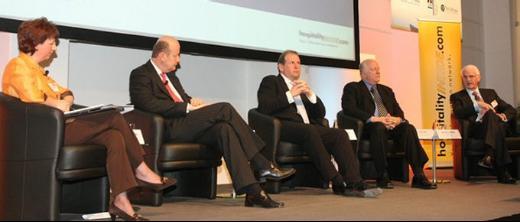
The chain managers of IHG and Marriott are still convinced that their business sizes as well as synergies and savings opportunities (economy of scale) due to gigantic (sales) systems of their companies will help them to manage the crisis - even though the requirements have never been as dismal as now. "Only few locations were able to escape the landslide," said Andrew Cosslett, CEO Intercontinental Hotels Group (IHG). The RevPar dropped in all IHG brands. "The world is undergoing a process of detoxification - we will all feel better afterwards," he said figuratively speaking.
ED FULLER, President &
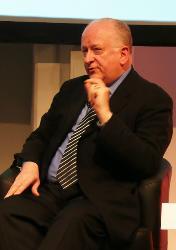
Managing Director
Marriott International:
37 years in business,
in charge of
3,178 hotels and
146,000 employees.
Ed Fuller, who has been in the business for 37 years and who is well-tried in times of crisis, allegedly has seen Marriott emerge stronger from every crisis. " We were able to increase our market share every time,," he said. Even Michael Ball, CEO Worldhotels, a network of 500 independent and privately operated hotels, registered a total of 52 new members in the crisis year 2008 - half of them were chain hotels! Gerald Lawless, CEO of the small 11-hotel luxury chain Jumeirah from Dubai is happy that the crisis affected him so early: of the 50 planned new projects until 2012, only 14 are under construction.
Cost reduction measures are clearly in the focal point due to the crisis. However, these measures should not have negative effects on the guests but bring something positive instead. "I carry my hand luggage for 3,000 miles. I have everything packed in there that I need. The last thing I want is that someone snatches away my luggage while I'm checking in and disappears behind a door," concluded Cosslett this train of thought. Moreover, he is convinced that hotels have to be more concerned with the needs of hotel guests in future. "We still don't know a lot about sleeping and relaxing", he stated well knowing that guests spend most of the time in their room doing just that. However, if Procter and Gamble developed hotels, they would have ordered an extensive market research and customer analysis beforehand and this has not been the case in the hotel industry so far, he said, criticising his own industry.
That is not all: the hotel industry is focusing more on people again in the crisis, whether staff or guests. Many chains are using the low-yield times for staff coaching. Ed Fuller, President and Managing Director at Marriott: "People are most important. We have to create an atmosphere where people feel comfortable." The crisis has noticeably increased the awareness for HR.
ANDREW COSSLETT, CEO
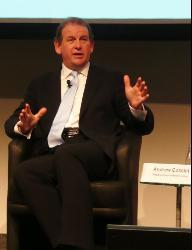
InterContinenal Hotels
Group: 4 years in business,
in charge of 4,150 hotels
and 300,000 employees.
Turning away
from technological upgrading
The technological upgrading of hotel rooms seems to be over. According to Cosslett, head of the world's largest hotel group, investments in the latest IT rooms seems unreasonable: "We invested millions in CD players. Just as we finished, MP3-players and I-Pods emerged. Then we invested in keyboards for PCs. And people came with their Blackberrys," he pointed out referring to the short life span of IT investments. Nowadays, the only thing that matters is that guests are able to access the network in the hotel. "The guests bring their own technologies," confirmed Michael Ball. More important were modern room facilities and bath facilities. A "heavenly bed" has to be accompanied by a "heavenly shower".
According to Ed Fuller, free internet access is no longer regarded as a distinguishing feature. More important for Marriott was a reasonable redesign of hotel rooms into comfortable living and working rooms. "IT should provide flexibility for the guests," emphasised Gerald Lawless. Even in a luxury hotel group, such as Jumeirah, self-check-in was conceivable. "Nobody's luxury experience is diminished in this way." Right now, students of the Dubai Business School are virtually developing "the perfect room".
In the meantime, all hotel chains think that investments in the internet are vital. "We invested 250 million dollars in the development of internet platforms. Those, who don't invest remain invisible." said Cosslett. For Marriott, IT has always been very important. "Our Chairman is a blogger; we get to know everything that is current. We know Twitter and Facebook. They are all there and we are aware of them," said Fuller.
Hotel properties: investors' pool
and investors' interests remain the same
The economic crisis is affecting all businesses; however, the hotel industry's representatives regard themselves as well-equipped and are showing no signs of panic. "Our brand diversity is contributing to ease the situation," said Fuller. Even in the US, Marriott has still planned 52 hotels; 47 of them can be realised according to schedule without problems. "However, the investors are still able to cancel," said Fuller relaxed. Among the investors, there are no considerable changes, not even in times of crises.
MICHAEL BALL, CEO
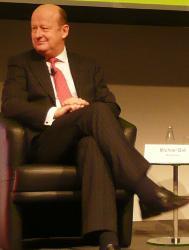
Worldhotels: 25 years in
business, in charge of
500 hotels in
70 countries.
IHG has the same approach: the group's approximate 3,200 hotels belong to about 2,000 owners - only 16 hotels are still owned by IHG. According to Cosslett, about 3,000 of the hotels are middle-class hotels (Holiday Inn/Express) and are mainly owned by smaller, conservative family businesses with good connections to local banks. This is also helpful for the quoted major company IHG. Gerald Lawless, Executive
Cosslett emphasised: "Times have been very exciting since 'Lehmann Day'.
We already refinanced last May and now the cash situation is very important. We are in strong and healthy shape for the most part. I don't know when the banks will provide money for investments again." In the last few years, selling off properties at IHG and most other chains has been an advantage said Cosslett. The hotel operators are thus able to concentrate more on service.
Gerald Lawless said that the present situation was not bad for building new hotels. Property developers would be able to profit from lower interest rates. Moreover, when the hotels open in two or three years, the recession would probably be over by then. However, the situation is different for hotels that had already opened or are in the opening process. "I am happy to be the baby among the hotel groups here," said Lawless. Promotions with the tourism office DTCM, Emirates Airlines and other hotel groups helped to increase the occupancy again in February and March 2009 to 90%, which had been forecasted at 55% in December. However, the average rate collapsed by 20% to 23%. "We have to paddle twice as fast as before and provide added value," advised Michael Ball, head of Worldhotels, his members.
More brands and more regulations exptected
Ed Fuller answered the question of the presenter Maria Puetz-Willems, Editor-in-Chief of hospitalityInside.com, about the "actual values" of a hotel management company
as follows: "First of all, there are the people, then the brands and finally the system." All CEOs think that the brand diversity will increase further as people are becoming more demanding - this is similar to the development in the car market, explained Cosslett, "even though huge numbers of each car brand are no longer being sold."
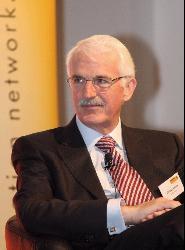
Chairman Jumeirah Group:
35 years in business,
in charge of 11 hotels and
11,500 employees.
The economic threats will change the guests' wishes at any rate. "After the recession, the guests will be different," forecasts Gerald Lawless. He believes the trend will go towards mixing business und leisure, to more (guest) hospitality and environmental protection. Ed Fuller gives boutique hotels, such as Jumeirah, a chance and sees the development of more marketing co-operations à la Worldhotels. "The average hotels will become better," said Cosslett, emphasising his opinion on the hotel of the future. However, there will be many more legal regulations concerning environment, safety and risk prevention. Just these things he sees looming in the offing for the next five years would have an influence on the customers' buying decisions. "And when hotels are not able to meet these new regulations, guests will remove these hotels from their lists," forecast the head of the world's largest hotel chain. / Susanne Stauss
To the summary of the CEO-Panel at the ITB Hospitality Day 2009, please click here.
To print this article you have to be registered and logged in for newsletter, visitor or subscription.





